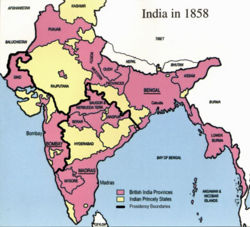Presidencies
The administration of British India was divided into three Presidencies that had developed from the East India Company's factory bases.
Factories
During the 17th century the East India Company established a number of trading posts which were called Factories. The first of these on the Indian subcontinent was at Masulipatam on the Coromandel Coast in 1611. The second was Surat in 1615. The three major trading centres which developed were:
- Fort St George on the Coromandel Coast (established 1640)
- Bombay on the northern Malabar Coast (given by King Charles II in 1668)
- Fort William at Calcutta in Bengal (established in 1690)
Presidencies
Surat was made the seat of the Western Presidency which incorporated Bombay until the Company's headquarters were transferred in 1687. The three principle factory locations developed to become the centres of Military and Political control as the Company’s influence grew during the 18th and 19th centuries and they became known as the three Presidencies of:
- Bengal - which included Burma and the Straits Settlements (Penang, Malacca and Singapore)
- Madras
- Bombay – which included Aden
Additionally, two other presidencies were established and subsequently disbanded:
Boundaries
The boundaries between the presidencies varied from time to time but their positions at the time of the Indian Mutiny are shown on the 1858 Presidency map at the top right of this page.
Following the establishment of the Raj in 1858, major changes took place;
- Berar, Saugor & Nerbudda and Orissa passed from Madras to Bengal in 1861. Central Provinces created at this time was therefore part of Bengal.
- Baluchistan was acquired by Bengal between 1876-1891.
By the 1930s, when India was approaching Independence, the map of India had become as shown on the map to the right.
Knowing which Presidency a town or city was in is important when consulting many of the India Office Records held at the British Library.
Also note that administrative boundaries changed from time to time and it is important to check 'border' districts in the adjoining area. The above map is adapted from Plate 21 of the (1931) revised atlas of the Imperial Gazetteer of India. Such small scale maps cannot show every enclave of territory, and this map is not to be taken as an authority for boundaries. For more detail see the provincial maps in the Imperial Gazetteer atlas, and large scale published Survey of India topographical maps.
